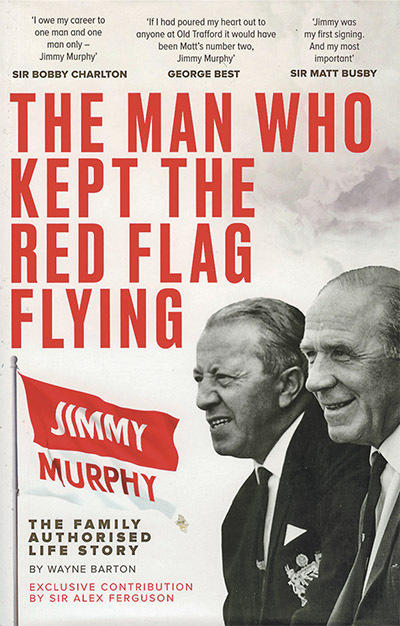
Jimmy Murphy – the family authorised life story
Trinity Sport Media, £16.99
Reviewed by Joyce Woolridge
From WSC 376, June 2018
Buy the book

Jimmy Murphy – the family authorised life story
Trinity Sport Media, £16.99
Reviewed by Joyce Woolridge
From WSC 376, June 2018
Buy the book
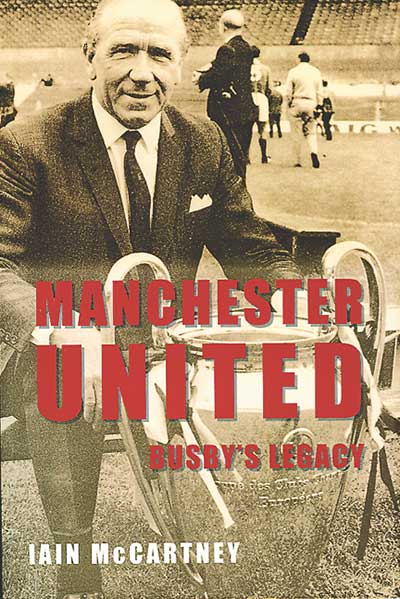 by Iain McCartney
by Iain McCartney
Amberley Publishing, £16.99
Reviewed by Charles Morris
From WSC 339 May 2015
A book about managerial succession and how a club attempts to replace an outstanding, long-serving supremo is timely, particularly in Manchester United’s case. Iain McCartney’s book follows his Rising from the Wreckage: Manchester United 1958-1968, which charted the club’s recovery from the Munich air tragedy to become the first English team to win the European Cup.
Rapid decline, however, is the theme of his sequel as he relates the club’s dismal failure to replace Matt Busby between 1968 and 1974 – when they were relegated from Division One – and to replenish the team of George Best, Denis Law and Bobby Charlton.
As a history of those six seasons it succeeds, but it seems a missed opportunity not to have broadened the format and considered other cases of managerial succession, particularly as United currently remain in a troubled transition from Alex Ferguson’s reign. Busby’s Legacy does, however, provide a case study in how not to handle such a handover. A tired Busby quit in 1969 after nearly 24 years that also included five domestic championships and two FA Cups. But he fatally remained as general manager and was allowed to choose his successor.
His choice of Wilf McGuinness proved disastrous – a history lesson ignored when Ferguson was allowed to select David Moyes. McGuinness, aged only 31, was Busby’s reserve team coach. He had no experience of managing a first team and was younger than some in an ageing United side, such as Charlton, Bill Foulkes and Shay Brennan. His authority was further undermined by initially being appointed only as “club coach” for an “unspecified probationary period”, and by the presence of Busby. The Scot kept the manager’s office while his successor was given a “corner cupboard”, and he later secretly tried to replace the hapless McGuinness with Celtic’s Jock Stein.
After McGuinness’s inevitable failure and removal in December 1970, Busby played a major part in the hiring of Frank O’Farrell from Leicester City. Although more experienced than his predecessor, O’Farrell’s record was “not trophy strewn”, including only one promotion with Torquay and an FA Cup runners-up and relegation with Leicester. Busby unsuccessfully tried the office belittlement trick on O’Farrell, too, and subsequently interfered in team matters.
One is tempted to conclude from these appointments that Busby, unconsciously, could not bear the idea of handing over to someone who might emulate his feats. After a disappointing 18 months O’Farrell was also sacked and replaced by Scottish national manager Tommy Docherty, who was unable to save the club from relegation before quickly restoring their fortunes back in Division One.
McCartney’s tale of a great team in decline for the most part rattles along, reminding us vividly of Best’s genius and his sad early fall into alcoholism, the complacency and ineptitude of United’s directors and the onset of two decades of appalling football hooliganism. It suffers, however, from an over-reliance on match reports, sticking only to the historic facts and dreadful editing. The book is littered with spelling errors and misused words, all of which are irritating and only one amusing: where the team’s performance is said to be “bisected with a fine toothcomb”. Readers paying £16.99 deserve better.
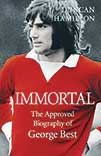 The approved biography of George Best
The approved biography of George Best
by Duncan Hamilton
Century, £20.00
Reviewed by Robbie Meredith
From WSC 322 December 2013
Despite what Immortal would have you believe, George Best divides opinion in his home country. For each of the tens of thousands who stood reverently in the Belfast rain for his 2005 funeral, there is a counterpart embarrassed and infuriated by the constant scandals and drunken antics. It is a mark of his status, of course, that most people in Northern Ireland still care enough to have an opinion about Best – good or bad – and it is unlikely that Duncan Hamilton’s “approved” biography will change what they think. Written with the blessing of Best’s sister Barbara, the sibling most active in guarding his memory, Immortal has few words of condemnation for even the worst of his excesses, preferring to depict chaos engulfing Best, rather than something he was primarily responsible for.
The early chapters, detailing his rise, are familiar but still thrilling. The shy, good-looking boy from Belfast, spotted by the legendary scout Bob Bishop and a surrogate son to Matt Busby, becomes the fulcrum of an outstanding Manchester United team until Europe is conquered when Best is barely 22. Even in the “el Beatle” years, he lodged in a neat terraced house with the redoubtable Mary Fullaway, and it was a home he would often return to even as things were going wrong in later years.
Yet the hour of Best’s greatest triumph, that 4-1 victory over Benfica at Wembley, is the beginning of a long, drawn-out end. Despite his iconic goal he felt he hadn’t played well in the final, a portent of disappointments to come. In the troubled aftermath the book, echoing its subject, rather loses its way. While we now know much more of the twin afflictions of alcoholism and depression, from which he undoubtedly suffered, I suspect that Hamilton makes more excuses for Best’s behaviour than Best, to his credit, actually did.
For, as Hamilton tells it, Best suffered primarily from feeling an excess of love, not for the booze and birds of tabloid tales, but for football and primarily Manchester United. His life does indeed come to resemble a kind of hell – in one telling passage, coachloads of visitors come to picnic in the unfenced garden of his ill-advised modernist home, Che Sera, and turn it into a spectral prison by gawping constantly through the all-encompassing glass.
Immortal becomes a long plea for understanding, and a lament that it wasn’t a quality successive Manchester United managers after Busby displayed in Best’s case. Yet although he was in the grip of twin evils, it is hard to see how Wilf McGuinness or Frank O’Farrell could have made more allowances for him, and Hamilton protests too much when he dismisses Best’s drink-driving, assaults and violence against women in little more than a few sentences.
Hamilton is a terrific writer but he seems more determined to be sympathetic towards his subject than Best, in his more reflective moments, was about himself. Immortal is a fine biography and a fascinating portrait of a dawning age of sporting celebrity, but will appeal most to those already inclined to view Best as the last of the doomed football romantics.
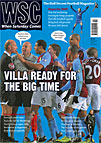 Some are wild cards, some club stalwarts. Jon Spurling looks at the life of the acting manager
Some are wild cards, some club stalwarts. Jon Spurling looks at the life of the acting manager
Newcastle and Sunderland rarely admit to having anything in common, yet the clubs’ recent moves to formalise the positions of Joe Kinnear and Ricky Sbragia represents a rare moment of triumph for caretaker managers. The fact that both clubs hankered after bigger names suggests that neither man’s position is secure, but at least they are likely to emerge with their self respect intact, unlike many hapless interim appointments.
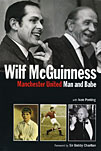 by Wilf McGuinness with Ivan Ponting
by Wilf McGuinness with Ivan Ponting
Know the Score, £17.99
Reviewed by Joyce Woolridge
From WSC 265 March 2009
Roy Keane’s response to his recent managerial difficulties was to grow a patriarchal, piebald beard. At least he could shave it off after a few days. Wilf McGuinness’s hair began to fall out in clumps and turn white when he was “relieved of his duties” at Manchester United and all he could do was briefly sport a trimmed ladies’ wig until an overenthusiastic Greek goal celebration dislodged it. McGuinness could teach Keano a thing or two about stress. As he says in his introduction, football has given him some tremendous highs, but has also “shattered his world” on several occasions.